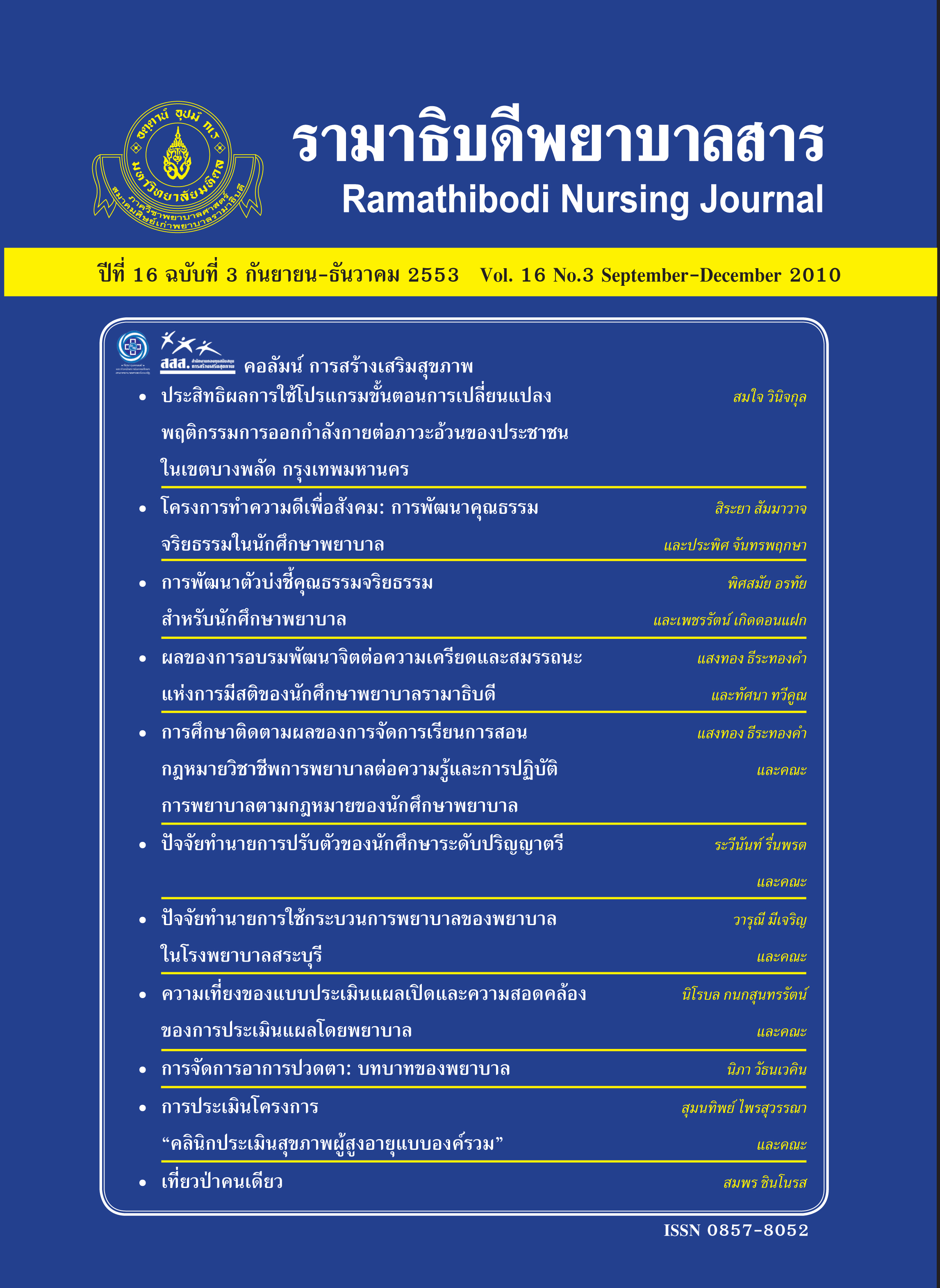ปัจจัยทำนายการปรับตัวของนักศึกษาระดับปริญญาตรี
Main Article Content
Abstract
บทคัดย่อ
การวิจัยครั้งนี้มีวัตถุประสงค์เพื่อศึกษา 1) ระดับการปรับตัว ระดับความหยุ่นตัวและระดับการยึดติดความสมบูรณ์แบบของนักศึกษาระดับปริญญาตรี และ 2) ความสามารถของปัจจัยส่วนบุคคล ความหยุ่นตัว และการยึดติดความสมบูรณ์แบบในการร่วมกันทำนายการปรับตัวของนักศึกษาระดับปริญญาตรีในมหาวิทยาลัย กลุ่มตัวอย่างที่ใช้ในการวิจัยครั้งนี้คือ นักศึกษาระดับปริญญาตรีในมหาวิทยาลัยราชภัฏพระนคร จำนวน 1,002 คน เก็บรวบรวมข้อมูลโดย แบบสอบถามเรื่องปัจจัยส่วนบุคคล ความหยุ่นตัว และการยึดติดความสมบูรณ์แบบในการทำนายการปรับตัวของนักศึกษาระดับปริญญาตรี และวิเคราะห์ข้อมูลโดยใช้สถิติบรรยายได้แก่ ค่าร้อยละ ค่าเฉลี่ย ส่วนเบี่ยงเบนมาตรฐาน และการวิเคราะห์การถดถอยพหุคูณแบบขั้นตอนโดยเทคนิค Stepwise ผลการวิเคราะห์ข้อมูลพบว่า 1) การปรับตัวของนักศึกษาอยู่ในระดับปานกลาง 2) ความหยุ่นตัวของนักศึกษาอยู่ในระดับมาก 3) การยึดติดความสมบูรณ์แบบของนักศึกษาอยู่ในระดับปานกลาง และ 4) การวิเคราะห์การถดถอยพหุคูณแบบขั้นตอน พบว่าปัจจัยส่วนบุคคลได้แก่ เพศ คณะ เกรดเฉลี่ยสะสม และอาชีพของมารดา ความหยุ่นตัว และการยึดติดความสมบูรณ์แบบสามารถร่วมกันทำนายการปรับตัวโดยรวมของนักศึกษาร้อยละ 33.5อย่างมีนัยสำคัญทางสถิติ โดยความหยุ่นตัวเป็นตัวแปรที่สำคัญที่สุดในการทำนายการปรับตัวอย่างไรก็ตาม ปัจจัยอื่นได้แก่ ชั้นปีที่ศึกษา รายได้ของครอบครัว อาชีพของบิดา ระดับการศึกษาของบิดา ระดับการศึกษาของมารดา จำนวนสมาชิกในครอบครัว ลำดับการเกิด ลักษณะการพักอาศัย ภูมิลำเนา และสถานภาพการอยู่ร่วมกันของบิดามารดา ไม่สามารถทำนายการปรับตัวโดยรวมของนักศึกษาอย่างมีนัยสำคัญทางสถิติ ดังนั้น มหาวิทยาลัยหรือผู้เกี่ยวข้อง จึงควรส่งเสริมหรือจัดโครงการเพื่อกระตุ้นเสริมสร้างความหยุ่นตัวให้นักศึกษา เพื่อให้นักศึกษามีการปรับตัวในบริบทของตนเองได้อย่างมีประสิทธิผล และความหยุ่นตัวจะเป็นพื้นฐานที่สำคัญต่อการพัฒนาตนเองที่ดีและการประสบผลสำเร็จในการเรียนรู้
คำสำคัญ : การปรับตัว, ความหยุ่นตัว, การยึดติดความสมบูรณ์แบบ, นักศึกษา
Abstract
The objectives of this research were to: 1) explore the level of adaptation,resilience, and perfectionism of undergraduate students; and 2) to examine the abilityof personal factors, resilience, and perfectionism to predict adaptation of undergraduatestudents in a university. The sample consisted of 1,002 undergraduate students inPhranakhon Rajabhat University recruited by proportional stratified random sampling.The data were collected using questionnaires and analyzed using descriptive statisticsand multiple regression with the stepwise technique. The results were as follows: 1)the adaptation of students was at the moderate level, 2) the resilience of students wasat the high level, 3) the perfectionism of students was at the moderate level, and 4)the analysis of stepwise multiple regression revealed that personal factors (i.e., gender,faculty, grade point average, and mother’s occupation), resilience, and perfectionismmutually account for 33.5% of the variance in adaptation of undergraduate studentsat the .001 level of significance. However, order of education year, family income,father’s occupation, father’s education, level mother’s education, number of familymember, order of birth, living arrangement, place of birth, and parent’s marital statusdid not significantly predict adaptation of undergraduate students. Thus, the educationalinstitute or involving organization should promote the program enhancing resiliencein students so that they can adapt themselves to their context effectively. Also, theirresilience would be fundamental for healthy development and successful learning.
Keywords : Adaptation, Resilience, Perfectionism, Undergraduate students
Article Details
บทความ ข้อมูล เนื้อหา รูปภาพ ฯลฯ ที่ได้รับการตีพิมพ์ในรามาธิบดีพยาบาลสาร ถือเป็นลิขสิทธิ์ของวารสาร หากบุคคลหรือหน่วยงานใดต้องการนำทั้งหมดหรือส่วนหนึ่งส่วนใดไปเผยแพร่หรือเพื่อกระทำการใด ใด จะต้องได้รับอนุญาตเป็นลายลักษณ์อักษรจากรามาธิบดีพยาบาลสารก่อนเท่านั้น


